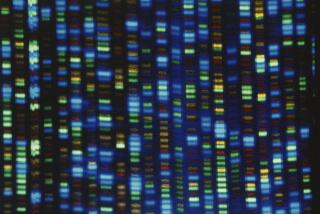Sequencing baby’s genome: a help in treatment or too much information?
- Share via
Diapers? Check. Infant car seat? Check. Comprehensive genome analysis? Roger that, too.
For thousands of newborns born in and around Boston; San Francisco; Kansas City, Missouri; and North Carolina over the next several years, a full genomic sequencing may be among the medical tests conducted in the first days of baby’s life.
The procedure is anything but routine. But a $20-million bucket of grants announced this week by the National Institutes of Health will help decide whether such genomic analysis should be among the routine screenings conducted on all newborns.
At issue in the studies to be undertaken are questions of health, efficiency, privacy and ethics, as well as squishier issues of parent-child attachment. Will having information on a baby’s distantly future health vulnerabilities make a difference in the kinds of medical treatments he or she gets, or on the ways his or her parents feed or care for him or her? When genomic analysis picks up on a genetic disorder or an inherited disease likely to crop up early, will even earlier interventions make a difference? Will physicians, parents and, ultimately, the babies themselves understand the significance (or the lack thereof) of the information they now have?
Some of the concerns to be tested are more practical: Will a child get speedier and better treatment when adverse -- or positive -- reactions to certain drugs can be predicted? Can smaller genomic panels -- those that sequence only the 2% of DNA made up of genes known to code for proteins in the body -- offer the same wealth of usable information more cheaply?
These questions are to be explored over the next five years at the medical centers of UC San Francisco, UC Berkeley and the University of North Carolina, and at Brigham and Women’s Hospital in Boston, Boston Children’s Hospital and Children’s Mercy Hospital in Kansas City.
As early as next year, newborns and their families are to start being recruited at the institutions. Researchers aim to sequence the babies’ entire genomes in as few as 50 hours -- turnaround time on a par with pinprick blood tests now routinely conducted to detect metabolic disorders such as phenylketonuria, blood disorders such as sickle cell anemia, endocrine disorders such as hypothyroidism or inherited diseases such as cystic fibrosis.
“Genomic sequencing has the potential to diagnose a vast array of disorders and conditions at the very start of life,” said Dr. Alan E. Guttmacher, director of the National Institute of Child Health and Human Development, which is co-sponsoring the grants alongside the National Human Genome Research Institute. “But the ability to decipher an individual’s genetic code rapidly also brings with it a host of clinical and ethical issues, which is why it is important that this program explores the trio of technical, clinical and ethical aspects of genomics research in the newborn period.”







